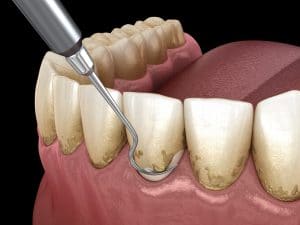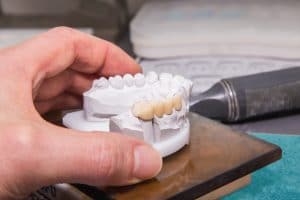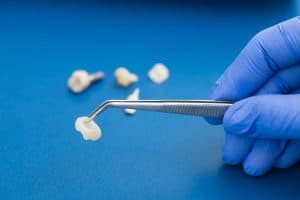 In our previous blog, we discuss the circumstances that arise causing the need for a tooth extraction. While your dentist will attempt to save your natural structure as best as it can be saved, sometimes the only option is to remove it. The problem is, however, that even though the compromised/diseased structure has been removed, the infection itself may still be present, threatening your remaining teeth and causing other complications down the line. In today’s blog, your Leawood, KS dentist will look at the benefits of replacing a lost structure and how it can significantly improve your oral health.
In our previous blog, we discuss the circumstances that arise causing the need for a tooth extraction. While your dentist will attempt to save your natural structure as best as it can be saved, sometimes the only option is to remove it. The problem is, however, that even though the compromised/diseased structure has been removed, the infection itself may still be present, threatening your remaining teeth and causing other complications down the line. In today’s blog, your Leawood, KS dentist will look at the benefits of replacing a lost structure and how it can significantly improve your oral health.
When Saving Your Smile Means Removing a Tooth
 As a busy adult, oftentimes the last thing on your mind is the need to have a tooth removed. For most cases, there is a list of procedures or treatment options that can usually prevent the need to remove one of your natural structures. Other times, however, a tooth may be beyond saving if it is too late in the process, leaving the only viable option as extraction. In today’s blog, your Leawood, KS dentist looks at when it is appropriate to remove teeth and what impact it has on your oral health.
As a busy adult, oftentimes the last thing on your mind is the need to have a tooth removed. For most cases, there is a list of procedures or treatment options that can usually prevent the need to remove one of your natural structures. Other times, however, a tooth may be beyond saving if it is too late in the process, leaving the only viable option as extraction. In today’s blog, your Leawood, KS dentist looks at when it is appropriate to remove teeth and what impact it has on your oral health.
What Grinding Your Teeth Really Does to Your Smile
 At one point or another as an adult you have experienced waking up from a restless night of sleep. Not only has this impacted your quality of sleep, but your day as well by causing fatigue, irritability, and more. Other times, you may have awoken with a headache or an aching jaw. While all of these circumstances occurring occasionally is normal, experiencing this all the time could be indicative of a bigger issue that can lead to oral health concerns such as worn teeth or a misaligned jaw. In today’s blog, your Leawood, KS dentist would like to address the phenomenon of teeth grinding and how it truly impacts your grin.
At one point or another as an adult you have experienced waking up from a restless night of sleep. Not only has this impacted your quality of sleep, but your day as well by causing fatigue, irritability, and more. Other times, you may have awoken with a headache or an aching jaw. While all of these circumstances occurring occasionally is normal, experiencing this all the time could be indicative of a bigger issue that can lead to oral health concerns such as worn teeth or a misaligned jaw. In today’s blog, your Leawood, KS dentist would like to address the phenomenon of teeth grinding and how it truly impacts your grin.
How Does a Tooth-Colored Filling Benefit My Smile?
 From a young age, we are informed about what happens when we do not stay on top of our oral hygiene. Indeed, tooth decay affects many individuals in one form or another, whether it is the development of a single cavity on a structure or if it has progressed to a point of loss. Typically, this can be avoided with routine preventive care at home, however, it is critical you do not miss your regular checkups, as this provides the dentist the opportunity to identify threats early on and gain a better probability of you making a full recovery. When cavities do develop, however, they can be addressed in a relatively simple manner if spotted early enough. With this in mind, your Leawood, KS dentist at Dreem Dentistry is here to explain how a filling can benefit your smile.
From a young age, we are informed about what happens when we do not stay on top of our oral hygiene. Indeed, tooth decay affects many individuals in one form or another, whether it is the development of a single cavity on a structure or if it has progressed to a point of loss. Typically, this can be avoided with routine preventive care at home, however, it is critical you do not miss your regular checkups, as this provides the dentist the opportunity to identify threats early on and gain a better probability of you making a full recovery. When cavities do develop, however, they can be addressed in a relatively simple manner if spotted early enough. With this in mind, your Leawood, KS dentist at Dreem Dentistry is here to explain how a filling can benefit your smile.
Preventing Periodontal Disease with a Deep Clean
 Adult tooth loss is not a common phenomenon, and certainly one that many do not keep in the forefront of their minds. While you may be practicing excellent preventive care at home, keep in mind that routine flossing and brushing is not enough to ensure a lifelong grin, and factors such as diet and examinations play a massive role as well. In fact, attending routine examinations at least once every six months is part of the standard care regimen, as it provides an opportunity to identify signs of concern before they become major dental issues. Concerns such as periodontal disease can be avoided if acted upon in a timely manner, and your Leawood, KS dentist at Dreem Dentistry is here to help with a deep clean.
Adult tooth loss is not a common phenomenon, and certainly one that many do not keep in the forefront of their minds. While you may be practicing excellent preventive care at home, keep in mind that routine flossing and brushing is not enough to ensure a lifelong grin, and factors such as diet and examinations play a massive role as well. In fact, attending routine examinations at least once every six months is part of the standard care regimen, as it provides an opportunity to identify signs of concern before they become major dental issues. Concerns such as periodontal disease can be avoided if acted upon in a timely manner, and your Leawood, KS dentist at Dreem Dentistry is here to help with a deep clean.
Addressing Cosmetic Blemishes with Porcelain Veneers
 With the holidays just around the corner, many can expect gatherings with family and friends and taking photos to document the warmth and comfort. Many individuals might view this occasion with fear, however, as slight unevenness and blemishes in your grin can cause anxiety in your appearance, making family photos something to avoid. Whether you experience noticeable chips or cracks, stains, or even gaps between teeth, your Leawood, KS dentist at Dreem Dentistry is here to help you fully enjoy your grin with the help of porcelain veneers.
With the holidays just around the corner, many can expect gatherings with family and friends and taking photos to document the warmth and comfort. Many individuals might view this occasion with fear, however, as slight unevenness and blemishes in your grin can cause anxiety in your appearance, making family photos something to avoid. Whether you experience noticeable chips or cracks, stains, or even gaps between teeth, your Leawood, KS dentist at Dreem Dentistry is here to help you fully enjoy your grin with the help of porcelain veneers.
When Dental Bridges Can Complete your Smile
 When a tooth becomes infected or otherwise compromised, it has a higher chance of being treated with a simple dental crown that can protect it from outside harm. But what if there are multiple consecutive teeth that are affected, or worse, missing completely? Having a gap in your grin from a missing oral structure is one thing, but having an entire area vacant can cause a variety of issues, including functional. What’s more, major gaps in appearance can significantly affect how one views their self and the level of confidence they exude. Fortunately, your Leawood, KS dentist at Dreem Dentistry is here to help with the use of a dental bridge.
When a tooth becomes infected or otherwise compromised, it has a higher chance of being treated with a simple dental crown that can protect it from outside harm. But what if there are multiple consecutive teeth that are affected, or worse, missing completely? Having a gap in your grin from a missing oral structure is one thing, but having an entire area vacant can cause a variety of issues, including functional. What’s more, major gaps in appearance can significantly affect how one views their self and the level of confidence they exude. Fortunately, your Leawood, KS dentist at Dreem Dentistry is here to help with the use of a dental bridge.
Reinforcing Your Tooth with a Dental Crown
 While routine preventive care is the crux of achieving a healthy smile for life, restorative dentistry has played a major role in making this goal achievable, as a variety of factors can contribute to unhealthy oral structures. Indeed, brushing and flossing are not enough to ensure a healthy appearance, as diet, physical activity, and more play a role in the status of your teeth. That being said, when a tooth experiences harm, trauma, or otherwise becomes compromised, it serves as a weak link that will continue to get worse and affect surrounding structures if left untreated. Fortunately, restorative measures such as a dental crown can be utilized to reinforce your grin, and your Leawood, KS dentist at Dreem Dentistry is prepared to help.
While routine preventive care is the crux of achieving a healthy smile for life, restorative dentistry has played a major role in making this goal achievable, as a variety of factors can contribute to unhealthy oral structures. Indeed, brushing and flossing are not enough to ensure a healthy appearance, as diet, physical activity, and more play a role in the status of your teeth. That being said, when a tooth experiences harm, trauma, or otherwise becomes compromised, it serves as a weak link that will continue to get worse and affect surrounding structures if left untreated. Fortunately, restorative measures such as a dental crown can be utilized to reinforce your grin, and your Leawood, KS dentist at Dreem Dentistry is prepared to help.
Protecting Little Grins with Preventive Dentistry
 By now, most individuals and families are aware of the negative consequences that arise from neglecting oral health. While some concerns such as cavities or plaque may appear minor and easily reversible when acted on in a timely manner, other circumstances such as root canal procedures, periodontal disease, and even extraction may inevitably be the result of poor hygiene. What’s more, starting early is imperative to maintaining a lifelong smile, which is why your Leawood, KS dentist at Dreem Dentistry emphasizes the importance of taking preventive dental measures, even for little grins.
By now, most individuals and families are aware of the negative consequences that arise from neglecting oral health. While some concerns such as cavities or plaque may appear minor and easily reversible when acted on in a timely manner, other circumstances such as root canal procedures, periodontal disease, and even extraction may inevitably be the result of poor hygiene. What’s more, starting early is imperative to maintaining a lifelong smile, which is why your Leawood, KS dentist at Dreem Dentistry emphasizes the importance of taking preventive dental measures, even for little grins.
Three Reasons You Should Not Skip Your Check-Up
 From a young age we are told the importance of maintaining a healthy and happy smile. We are told to brush and floss regularly, and that if we keep up with that, we would be able to have a lifelong dazzling smile. The fact of the matter is, however, that flossing and brushing are only half of the battle, and that attending routine checkup examinations and cleanings are a necessary portion of the standard dental regime. Fortunately, the team at Dreem Dentistry in Leawood, KS want to help you stay on track for a life-long grin and understand the benefits of attending regular visits.
From a young age we are told the importance of maintaining a healthy and happy smile. We are told to brush and floss regularly, and that if we keep up with that, we would be able to have a lifelong dazzling smile. The fact of the matter is, however, that flossing and brushing are only half of the battle, and that attending routine checkup examinations and cleanings are a necessary portion of the standard dental regime. Fortunately, the team at Dreem Dentistry in Leawood, KS want to help you stay on track for a life-long grin and understand the benefits of attending regular visits.






